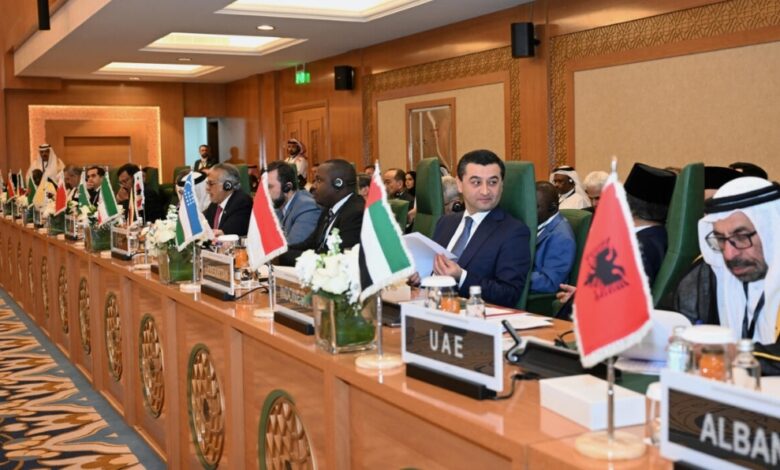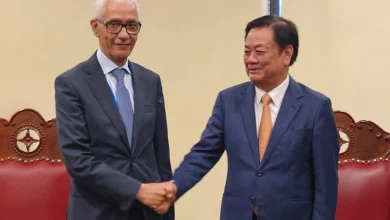The Reconstruction of Gaza: Cairo Plan Adopted by the Arab League and the OIC

Jawad KERDOUDI – President of the IMRI
On October 7, 2023, Hamas, which controls the Gaza Strip, launched an attack on Israel. Israel responded immediately with airstrikes, followed by a ground operation. This asymmetrical war between a structured army and a resistance movement has resulted in enormous human and material losses. The Palestinian side counts over 47,000 dead, 111,000 injured, 10,000 missing persons, and 1.9 million displaced individuals. On the Israeli side, the toll stands at 2,000 dead, 13,500 injured, with 251 hostages taken, 25 missing, and 200,000 people displaced. The Gaza Strip has been completely devastated by the Israeli army and is currently just a field of ruins.
The United States has provided significant financial and military aid to Israel, both under President Joe Biden and former President Donald Trump. On Tuesday, February 4, 2025, during a visit from Netanyahu to Washington, President Donald Trump proposed a bizarre idea to transform the Gaza Strip into a "Riviera of the Middle East," by relocating the 2.4 million Gazans to Egypt and Jordan and taking control of Gaza. This amounts to a colonial war, as Gaza was destroyed by bombs and missiles supplied by the U.S. to Israel. Moreover, under international law, any forced relocation of a population is considered a war crime. Netanyahu found the idea "remarkable," adding that it was the most original proposal in years. Trump presented it to Egypt and Jordan, neighboring countries that both receive military and financial assistance from the United States.
The following day, February 5, 2025, King Abdullah II of Jordan rejected any initiative to annex the Gaza Strip by the United States as well as any forced relocation of Gazans. Egypt categorically rejected Trump’s proposal, labeling it "ethnic cleansing." Jordan did, however, agree to receive 2,000 sick Gazan children to treat them in its hospitals. They noted that 3,000 American soldiers are stationed on Jordanian soil and that they have helped intercept Iranian missiles targeting Israel. It is commendable that these two Arab countries have taken such a courageous position despite American pressure.
To reinforce its position regarding the Gaza Strip, Egypt convened an extraordinary Arab Summit that took place on March 4, 2025, in Cairo. This summit adopted a plan for the recovery and reconstruction of Gaza, presented by Egypt in coordination with the State of Palestine and Arab countries. This plan amounts to $53 billion over five years. The final communiqué called on the international community, as well as international and regional financial institutions, to provide the necessary support for this plan promptly. It also proposed the establishment of a fund for contributions from all donor states and funding institutions to carry out the reconstruction projects. The summit also commended the Palestinian decision to create a Gaza Management Committee, composed of experts from Gaza, for a transitional period aimed at facilitating the return of the Palestinian Authority to Gaza. The plan proposed by Egypt consists of three phases. The first phase, costing $3 billion over six months, will focus on clearing mines and rubble and constructing temporary housing for 1.5 million people. The second phase, costing $20 billion, will address essential infrastructure and permanent housing. The third phase, costing $30 billion, will complete infrastructure development by creating an industrial zone, a commercial port, and an airport. The plan is intended to coincide with the initiation of a political process, aiming for a sustainable and just solution that allows the Palestinian people to realize their legitimate aspirations for establishing an independent state and to live in peace and security. Finally, the summit urged the UN Security Council to deploy international peacekeeping forces to ensure the safety of both Palestinian and Israeli peoples and emphasized the vital role of UNRWA in assisting Palestinian refugees.
On another note, the Cairo Summit condemned Israel’s reversal regarding the ceasefire plan signed on January 15, 2025, which came into effect on January 19. Indeed, the second phase of this plan stipulates the total withdrawal of Israeli forces from Gaza and the return by Hamas of all remaining Israeli hostages. Israel has failed to fulfill its commitment, wishing to extend the first phase until April 2025, claiming this was a U.S. proposal. On March 2, 2025, Israel blocked humanitarian aid to Gaza, and on March 9, it cut off electricity supplies.
The Organization of Islamic Cooperation (OIC), representing 57 Muslim countries, formally adopted the Arab plan for the reconstruction of Gaza on Saturday, March 1, 2025, in Jeddah, Saudi Arabia. The United Nations, Germany, France, the United Kingdom, and Italy praised the Arab plan for Gaza, describing it as "a realistic path towards the reconstruction of Gaza." The next step will be to get it adopted by the European Union, Japan, China, and other countries.
Our Foreign Minister, Nasser Bourita, who attended the Arab League Summit and the OIC ministerial meeting in Jeddah, reaffirmed King Mohammed VI’s consistent support for the legitimate rights of the Palestinian people. He stressed that Gaza and the West Bank are integral parts of Palestinian territory, and that only the Palestinian people should decide their future. He emphasized the necessity of reinforcing the ceasefire, facilitating the delivery of humanitarian aid, and ensuring sustainable reconstruction within an inclusive political framework. The minister highlighted the importance of preserving the legal status of Al-Quds (Jerusalem) and reaffirmed King Mohammed VI’s commitment, as President of the Al Quds Committee, to the protection of the holy city and support for its residents, facilitated by the crucial role of the Al Quds Committee and the Bayt Mal Al-Quds Agency.
In conclusion, the adoption of the Egyptian plan for the reconstruction of Gaza by the Arab League, OIC, UN, and major European powers politically isolates Israel and the United States. It is imperative that Arab and Muslim countries effectively reconstruct the Gaza Strip, which will demonstrate their determination. Beyond the reconstruction of Gaza, the only solution to end the Israeli-Palestinian conflict is the establishment of an independent and viable Palestinian state. This conflict did not begin on October 7, 2023, but on May 14, 1948, when Israel forcefully declared its independence over land that did not belong to it, resulting in the exodus of 750,000 Palestinians.






